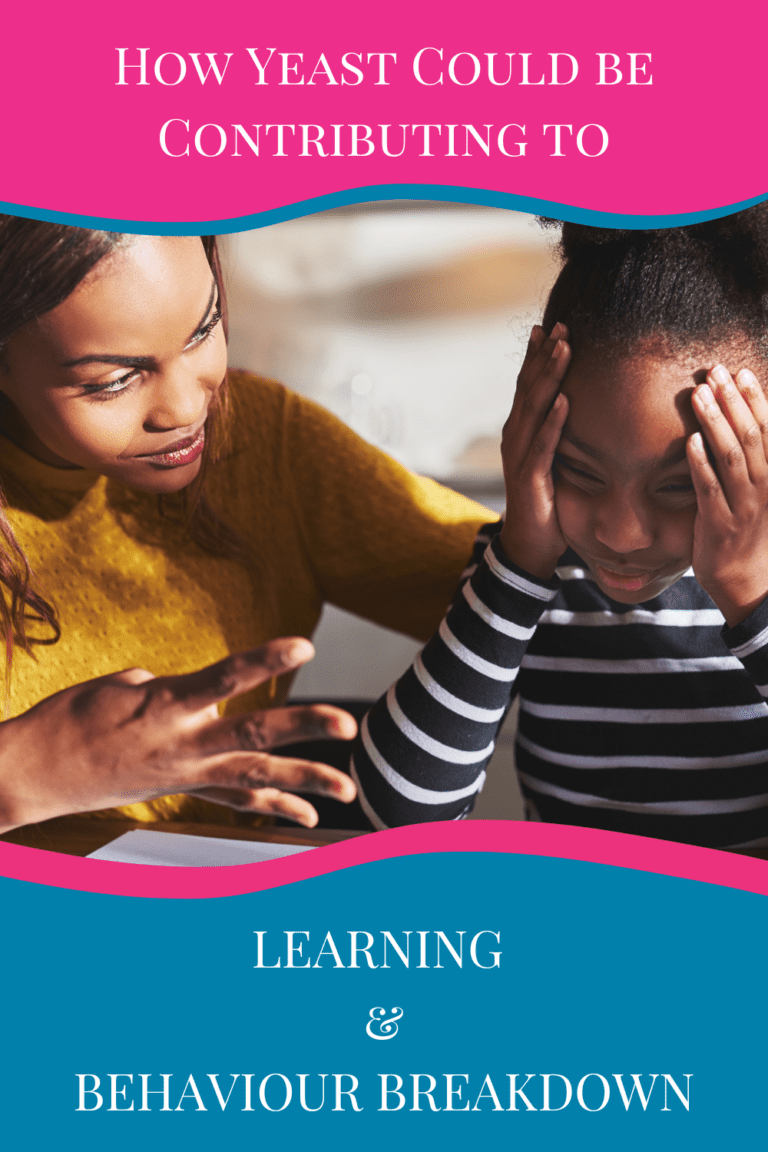If your kid loves sugar and carbs, yeast could be a factor in their learning & behaviour challenges.
This fungus resides naturally in your child’s gut but if unchecked can seriously impact their cognitive function.
How Candida Affects Learning & Behaviour
A ground-breaking study in 2019 confirmed what many doctors have been saying for decades – yeast can affect behaviour and learning.
The Baylor College of Medicine study found candida can cross the blood brain barrier, cause neuroinflammation and lead to brain fog and impairments with memory comparable to Alzheimers.
Several studies have linked candida to everything from ADHD, dyslexia, learning disabilities to schizophrenia.
In 1986 Dr. William Crook linked yeast to learning disabilities, hyperactivity, ADD, food allergies and emotional disorders.
That doesn’t mean that candida is the sole factor in these conditions but treatment resulted in moderate improvement to total recovery.
Is Your Child Acting Drunk?
Several studies found children with candida at times appeared ‘drunk’, had uncontrollable laughing fits, poor coordination and foggy thinking.
Some have ‘blown over’ on a breathalyzer with zero alcohol consumption!
You see, when yeast ferments it releases byproducts that are toxic to your child’s brain and nervous system: alcohol and acetaldehyde to name a few.
These toxins can disrupt sleep, learning and behaviour.
Alcohols are known to depress the nervous system. This is why some kids can almost appear drunk when they have an overgrowth of candida.
Yeast Can Anaesthetise the Brain
Certain aldehydes are anesthetics which make the brain ‘sleep’ and impairs cognition and learning because it:
#1 Causes a deficiency in B1 which is a critical brain nutrient.
#2 Damages brain cells similarly to severe alcoholics and Alzheimer’s patients.
#3 Reduces the oxygen transported by red blood cells to the brain.
When the Liver Can’t Keep Up
Yeast overgrowth results in your child’s liver being unable to clear the amount of toxic byproducts being released. The result is these toxins circulate into the bloodstream and brain thereby impacting brain chemistry and function.
They slow down cognitive processing, resulting in poor learning, focus and self-regulation.
The Connection Between Learning & Behaviour Disorders and Picky Eating
There’s a high rate of picky eating among kids with learning and behaviour disorders and it’s no coincidence.
Candida feeds off sugar and carbohydrates, thereby hijacking your child’s tastebuds and driving cravings for sugar and carbohydrates which can result in moderate to serious picky eating.
This becomes a vicious cycle because as your child eats more sugar and carbs, the yeast proliferates.
The Brain-Gut-Immune Axis
As far back as the 1980’s it was noted that kids with ADHD, learning difficulties and autism were more likely to have asthma, allergies, eczema as well as digestive and immune issues.
One reason is that candida can also dysregulate the immune system, disrupt digestive enzyme function and cause overall inflammation of the gut and gut permeability AKA ‘leaky gut’.
When this happens there is also increased risk of:
- Nutrient deficiencies
- Food sensitivities
- Immune issues like asthma, allergies, eczema
All of this further exasperates physical health as well as the health of the brain.
So you might be wondering how do I know? There are several different tests but getting to know the signs is a sure place to start.
Signs of Candida Overgrowth:
- Poor focus
- Brain fog or spacey
- Skin rash (especially in infants)
- Gas, bloating, constipation, diahrea
- Hyperactivity (especially silliness after eating a high carb or sugar meal)
- Fungal/Yeast infections of genitals, nails, feet, thrush
- Inappropriate laughter
- Mood swings
- Poor memory
- Diaper rash
- Itchy bum
- Worse on damp, rainy days
- Cradle cap
- Autism
- Fatigue
- Colicky longer than 3 month
- At times appear drunk
- Anxiety, irritability, depression or isomnia
- Eczema, Acne
- Recurrent ear issues
- Craves sweets
- Headaches
- Respiratory issues (cough, wheezing
Causes of Yeast/Candida:
- Mom had candida or poor gut health at time of pregnancy and delivery
- Antibiotic use
- Diet high in sugar, carbohydrates and processed foods
- Fluoridated and chlorinated water
- Impaired immunity
- High mercury levels or other toxins
- Birth control pills
What To Do:
A key part of getting candida in check is diet. Gradually reducing the amount of sugar and excess carbohydrates that your child is eating is imperative.
This can be challenging when you have a very picky eater which is why it is important to address other underlying factors related to picky eating like nutritional deficiencies as well as retained reflexes.
I caution parents against yeast protocols that are too aggressive or require rigid diet changes if not absolutely necessary since this can exasperate picky eating.
Certain natural anti-fungals can be helpful to address yeast overgrowth but the constitution and level of sensitivity of the child should determine which anti-fungal to use.
Drainage and Detox is Key
It’s also essential to ensure that drainage and detoxification pathways are functioning optimally since killing off candida can increase the production and release of the toxic byproducts which can result in a worsening of symptoms.
Learn more about how to optimize your child’s learning and behaviour through gut healing, detoxification, nutrition and neuroplastic and cognitive exercises by booking a free Clarity Call.
Sources:
https://journals.sagepub.com/doi/abs/10.1177/105345128401900501?journalCode=isc
https://scholar.google.com/scholar?hl=en&q=candida+brain+gut+psychiatric&btnG=&as_sdt=1%2C33&as_sdtp=
https://www.bcm.edu/news/fungi-cause-brain-infection-in-mice
https://www.ncbi.nlm.nih.gov/pmc/articles/PMC6275220/
https://psycnet.apa.org/record/1984-23153-001
https://www.medicalnewstoday.com/articles/322722#other-infections
https://www.greatplainslaboratory.com/candida-and-yeast-overgrowth


